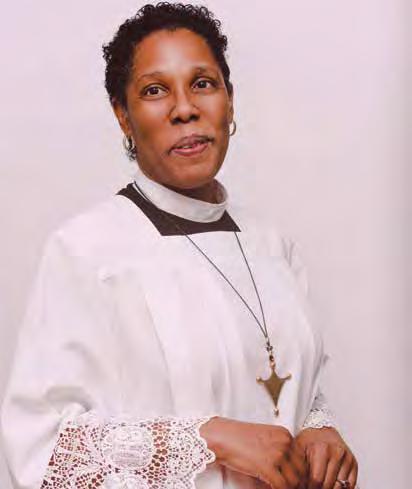
5 minute read
From Pantry to Pulpit
from USPG Koinonia Issue 5 2/2021
by USPG
FROM PANTRY
TO PULPIT
By the Very Rev’d Shelley-Ann Tenia, Diocese of Trinidad & Tobago.
Gender justice in the Caribbean is complex and contradictory. Examining culture while sifting through external influences requires courage and endurance. Justice is not an act of benevolence dependent on the benefactor, but an intrinsic human right. Consider this: twentyfive-year-old Justine is contemplating a call to ordained ministry. She wants to serve God but is not sure about the Church. At sixteen, she became pregnant by the twenty-one-yearold head server. She lost her innocence, her ministry, her privileged status, and her honour. Chief concerns were the Church’s reputation, her family’s plans for her, the young man’s longterm relationship, and the negative influence on other young people. Unspoken but inferred, they preferred that she (or the situation) disappear. She was told that if she wasn’t so “womanish” this could have been avoided: the head server was advised to be more careful. His ministry was uninterrupted. Was justice done? For the decision-makers, yes; a new life was preserved, all parties protected, and peace prevailed. But was there justice for Justine? The Cambridge Dictionary of Christianity states that the Hebrew scriptures insist on justice. It was a gospel imperative for Jesus. God expects us to order our societies justly, and has special concern for those who are vulnerable, violated, or treated unjustly. Justice is intrinsic to the Church’s Mission. So why is justice so elusive for the Church? Achieving justice in societies built on stratified, patriarchal, hierarchical class systems, necessitates addressing issues of gender inequality. At the heart of justice work, in our post-colonial context, is converting our selfunderstanding and ordering our relationships justly. The Church’s leadership is essential in realizing this vision. She must: leverage Her privilege to address systemic issues of gender inequality and gender-based violence; lead in public initiatives that foster collaboration among faith groups and local communities, and work towards integration and strategic lobbying for greater social impact; renew Her commitment to justice as part of Her mission with the same power and authority as Jesus, who confronted and upended harmful cultural norms whilst serving those at the margins. A courageous step for the Church would be reordering its operational policies through the kind of bold transformational leadership that made women’s ordination possible and to invest in education, healthcare, and other social services for girls and the marginalised. Proactive steps toward workplace equality include closing the gender pay gap, ensuring adequate paid parental leave for men and women, and committing to non-judgmental inclusion with support and development of women’s leadership. We must become more
Photo: the Very Rev’d Shelley-Ann Tenia

17 I
ISSUE 5 3/2021
a woman’s rightful place is in the pantry
FROM PANTRY TO PULPIT

intentional about the formation, development, training and continuing education of clergy and lay leaders to include clear behavioral standards that cultivate a culture of peace and respect in every space Church space. We should invest in the implementation of a safeguarding policy to protect women from sexual harassment, demand justice for girls, shelter young men from attitudes of toxic hypermasculinity, and hold errant lay and ordained persons to account. The Church may thus regain its moral authority and can use the power inherent in its privilege for strategic engagement of policymakers, advocating for more robust laws and policies, speaking out against corruption and societal violence, eventually dismantling the insidious patriarchal system. Provincial dioceses attempt to sensitize and educate members and to raise public awareness about gender justice, via their ministries and in collaboration with partners. However, the Church’s teachings still seem irrelevant to many. Gender inequalities go unheeded, violence and moral decay prevail, and the Covid-19 pandemic has laid bare societal and institutional gaps.
Where cultural expectations are rigid, toxic, oppressive, and violent, the Church’s most powerful influence can be in their transformation. Some church leaders recognise the value of its access to citizens in the street and in the pew, to influence local policy and help mobilise community projects. More is needed to affirm and reinforce the values of care and prudent environmental stewardship in the context of households, schools, and workplaces. Equitable use of human resources, care of the Earth, poverty eradication, attending to mental health, and creating safer communities should become common concerns for faith and non-faith collaborative groups. In the urban city center of Port of Spain (home to the Cathedral’s ministry) issues of poverty, inequality, stigmatization, and violence remain. Young women, children, grandmothers, struggling young men, tentative migrants, and mothers in pain all seek a better life but feel caught in the dragnet of gender injustice. People long for the sense of safety, shared identity and belonging that a faith community provides. We work toward a more just ordering of our relationships, through focused teaching and formation practices that influence how people perceive themselves and each other, how they act and interact, how they share roles and responsibilities and impact the distribution of power and resources. For us, fledgling relationships with other faith and secular groups need strengthening to seek justice for those at the margins: undervalued domestic workers and others needing a fair wage; equitable access to financial services for women and men who work in the informal sector; safety and security for the increasing flow of migrants; trafficked women and children; the elderly; the LGBTQI community; and other stigmatized groups. Deeper connection to and conversations with gang-ridden, poorer communities to interrogate the interconnected economic, social and political spheres of daily life and deeply embedded gender inequalities. These conversations create opportunities for reconciliation processes that can lead to peaceful coexistence. Intentional 21st century mission and discipleship requires a return to justice as a core personal and societal value. Just ordering of relationships involves treating all people fairly; ensuring equity; protecting the weak; extending mutual respect, care and concern; celebrating differences; promoting complementarity, equality and integration; honouring the dignity and intrinsic worth of every person. Will our grandchildren inherit notions that a woman’s rightful place is in the pantry, and that God rightly ordained men to be in pulpits and in halls of power? Or will we faithfully persevere to shape Caribbean culture, free of unhealthy patriarchy and full of the treasures of our unique shared humanity? ■
Rev’d Shelley-Ann Tenia










